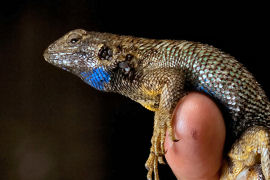
Many genes in our bodies are permanently turned off as part of normal development. But sometimes that process goes awry, turning off genes that should otherwise remain active. The new field of epigenetic therapy, as explained by the USC researchers in a review paper published in the journal Nature, aims to switch these genes back on.
In their article, Peter Jones, of USC/Norris, and his colleagues lay out their new perspective on the treatment of genetic disorders by discussing the potential ways to interfere with epigenetic gene silencing, and the ways in which that potential is already being exploited.
The Nature review comes just days after the FDA approved the epigenetic inhibitor azacitidine for the treatment of a bone-marrow disorder known as myelodysplastic syndrome (MDS). MDS, which is characterized by the production of abnormal, immature blood cells, affects between 10,000 and 30,000 people each year, is most prevalent in people over age 60, and can be fatal. Until now, there was no approved treatment for MDS.
Azacitidine was first synthesized in the 1960s in Czechoslovakia; it received its first exposure in the United States in the Childrens Hospital Los Angeles laboratory of then-fellow Peter Jones. Although the drug had initially been envisioned as a chemotherapy agent, Jones showed that it had great utility in the laboratory because it could turn on genes that had been previously locked down by methylation – a type of epigenetic change in which a methyl group becomes physically attached to the region of a gene that regulates its production of protein, shutting it down.
But Jones, who is one of the world’s pre-eminent epigenetics experts, says that azacitidine’s approval is bigger than its role in MDS.
“This is the first approved drug in a new kind of therapy-epigenetic therapy,” Jones notes. “That gives it tremendous potential importance not just in this disease, but in a host of others as well.”
Indeed, cancer and its relatives are far from the only conditions that may be affected by epigenetic gene silencing, Jones notes. A number of other diseases – most notably several that can lead to intellectual disabilities – appear to have epigenetic roots. Among them are Fragile X syndrome, Angelman syndrome, Prader-Willi syndrome and Rett syndrome. Jones also sees the application of epigenetics to combat disorders caused by aging, providing the opportunity to turn on the genes shut down by the aging process.
And the search for the right drugs to undo the epigenetic damage is equally wide-ranging. Jones is involved in research into the utility of a compound called azadeoxycytidine – a more specific version of azacitidine that only affects DNA and thus potentially carries fewer side effects. Many of the major pharmaceutical companies have at least one methylation inhibitor trial ongoing, Jones adds, and there are dozens of additional compounds being screened for their potential utility.
“It is apparent that we are just at the beginning of understanding the substantial contributions of epigenetics to human disease, and there are probably many surprises ahead,” Jones and colleagues note in their review. “Elucidating the whole bandwidth of epigenetic mechanisms is an exciting challenge and will eventually lead to a clearer understanding of the development of human disease and direct therapeutic concepts into new directions.”


















Comments are closed.